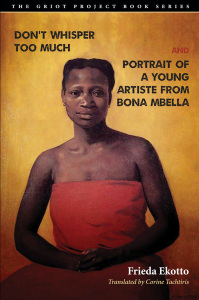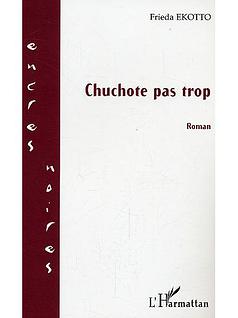Whisper Too Much and Portrait of a Young Artiste from Bona Mbella
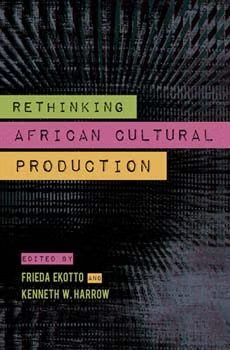 Rethinking African Cultural Production (2015)
Rethinking African Cultural Production (2015)
Edited by Frieda Ekotto and Kenneth W. Harrow
Frieda Ekotto, Kenneth W. Harrow, and an international group of scholars set forth new understandings of the conditions of contemporary African cultural production in this forward-looking volume. Arguing that it is impossible to understand African cultural productions without knowledge of the structures of production, distribution, and reception that surround them, the essays grapple with the shifting notion of what “African” means when many African authors and filmmakers no longer live or work in Africa. While the arts continue to flourish in Africa, addressing questions about marginalization, what is center and what periphery, what traditional or conservative, and what progressive or modern requires an expansive view of creative production.
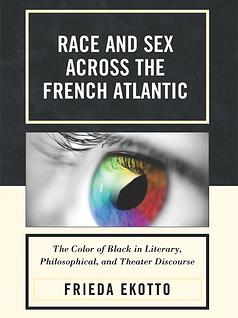 Race and Sex across the French Atlantic: The Color of Black in Literary, Philosophical, and Theater Discourse (2012)
Race and Sex across the French Atlantic: The Color of Black in Literary, Philosophical, and Theater Discourse (2012)
Jean Genet’s masterpiece Les Nègres was first published in 1958, in the midst of the Algerian war, and first performed at the Théâtre de Lutèce in Paris in October 1959. Yet even though the play is more than 50 years old, it remains a fundamental contribution to critical race theory, as Genet unequivocally posits that no matter what a black person does or doesn’t do, simply to be black in our times is itself a tragedy.
Placing Genet in the context of Negritude movement, Race and Sex across the French Atlantic equally reveals and examines blackness within the African-American dialogue with a white French author’s provocative questions about race: “Is a black man always black?” and even more fundamentally, “What is blackness?” Within this framework, to question “blackness,” therefore, is to set out on an ontological quest, as “blackness” has become a real, living thing in its own right within European ideology, social theory, and historical consciousness, even as Les Nègres has taken its place as a major text in the francophone and philosophical tradition of writing on race.
In essence, this book concentrates on the way in which language-particularly the French language-has shaped ideas about race within transatlantic discourses, and, with its companion, continental philosophy, has also shaped the historical understanding of discourse on race. It navigates between multiple readings of race within the French Atlantic using Lorraine Hansberry’s play Les Blancs; Dany Laferrière’s Comment faire l’amour avec un Nègre sans se fatiguer; Genet’s dialogue with the Black Panthers; and different conceptions of the so-called N word. Race and Sex across the French Atlantic thus explores how Les Nègres offered a groundbreaking reading of how race functioned-and continues to function-as an all-pervasive discourse that provides a central principle around which society in general is organized.
(Reviewed by Roxanna Curto)
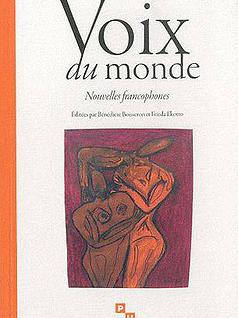 Voix du monde : Nouvelles francophones (2011)
Voix du monde : Nouvelles francophones (2011)
Edited Bénédicte Boisseron and Frieda Ekotto
Voix du monde : nouvelles francophones est un recueil de quatorze nouvelles, inédites ou reprises, écrit par quatorze auteurs célèbres, dont treize ont reçu les distinctions honorifiques du monde littéraire francophone. Il se veut une manière de lecture de la littérature francophone qui se refuse d’être focalisée à une région (continent africain, les Caraïbes ou autres), et offre en lieu et place une démarche polysémique au-delà d’une cartographie particulière. Le débat est d’entrée de jeu ouvert entre ce que les éditrices nomment “littérature du divers de langue française” (15) et la “littérature-monde” (12) de Le Bris. À partir d’une fine analyse en guise d’introduction, elles soulignent le danger pervers de cette dernière qui, à l’image du monde colonial de compartimentation à la Fanon, essaierait de “sectariser à nouveau la littérature de langue française” (14). La littérature du divers, loin de n’être qu’une theoria, dans le sens de contemplation désengagée, va se nourrir à la source d’une imagination humaniste, comme expression de l’Einfühlung : la saisie de l’autre afin d’apprendre à vivre avec l’autre dans une poétique de la relation à la Glissant. En rapport avec l’essence même de la francophonie, le souci de dé-compartimentation aura pour point de départ le divers, et pour point d’arrivée un regard diversifié en des possibles infinis. Il est porteur d’inventions néologiques et de transformations de nouveaux espaces du dicible, audelà des frontières vierges de la nation, sans nécessairement l’exclure. Le divers à ce niveau est la réalité qui projette son regard dans le miroir de la langue pour retrouver la polysémie de ses mondes. C’est ce qui va donner à toutes les contributions de ce collectif un regard, un style qui tire sa source dans la subjectivité ordinaire de tous les espaces physiques avec lesquels les contributeurs ont été extraordinairement en contact
(Review by Charles Gueboguo)
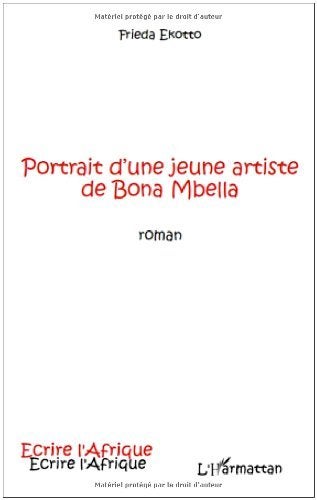 Portrait d’une jeune artiste de Bona Mbella
Portrait d’une jeune artiste de Bona Mbella
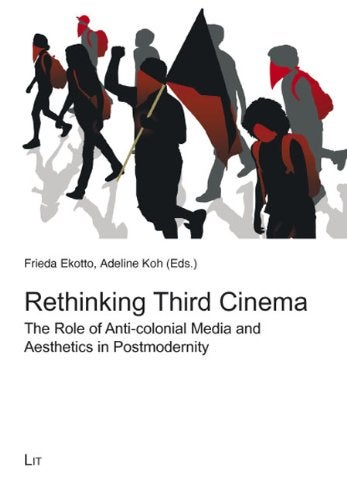 Rethinking Third Cinema: The Role of Anti-colonial Media and Aesthetics in Postmodernity
Rethinking Third Cinema: The Role of Anti-colonial Media and Aesthetics in Postmodernity
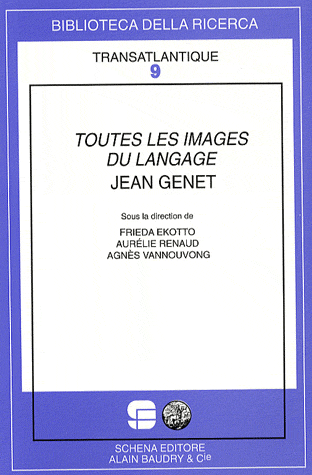 Toutes les images du langage : Jean Genet
Toutes les images du langage : Jean Genet
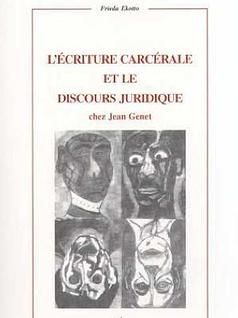 L’Ecriture carcérale et le discours juridique chez Genet/Prison Writing and Legal Discourse in Jean Genet
L’Ecriture carcérale et le discours juridique chez Genet/Prison Writing and Legal Discourse in Jean Genet
L’Esprit Créateur on the topic of “Narrative and Confinement”


